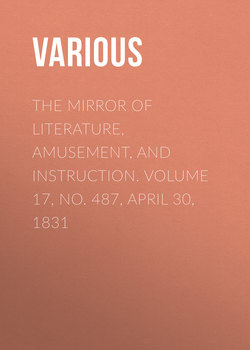The Mirror of Literature, Amusement, and Instruction. Volume 17, No. 487, April 30, 1831

Реклама. ООО «ЛитРес», ИНН: 7719571260.
Оглавление
Various. The Mirror of Literature, Amusement, and Instruction. Volume 17, No. 487, April 30, 1831
BIRTHPLACE OF LOCKE
THE KNIGHT OF TOGGENBURG
CORFE CASTLE—EDWARD II
LINES WRITTEN IN A CHURCHYARD
ANCIENT BOROUGH OF WENDOVER
MANNERS & CUSTOMS OF ALL NATIONS
HIPPODROME GAMES
THE SKETCH-BOOK
THE BEGGAR WOMAN OF LOCARNO
SPIRIT OF DISCOVERY
HYDROSTATICS AND PNEUMATICS
REFLECTION
STATUE OF PETER THE GREAT
SPIRIT OF THE PUBLIC JOURNALS
FAMILY POETRY
SIR JOHN HAWKINS’S HISTORY OF MUSIC
ITALIAN, AT THE KING’S THEATRE
THE COSMOPOLITE
COINCIDENT POPULAR SUPERSTITIONS
FINE ARTS
COLONEL BATTY’S VIEWS OF EUROPEAN CITIES.—NO. IV
THE SELECTOR; AND LITERARY NOTICES OF NEW WORKS
ANGLO-SAXON HISTORY
THE GATHERER
SERMONS
SANCTUARY
CHINESE INGENUITY
LOUIS XI. AND THE VIRGIN MARY
LOYAL BEQUEST
SHETLAND ISLES
A SAFE WAY TO OPEN STALE OYSTERS
EXTRAORDINARY DISAPPEARANCE
POPULAR SCIENCE
Отрывок из книги
At the village of Wrington, in Somersetshire, in a cottage by the churchyard, was born JOHN LOCKE. What a simple, unostentatious record is this of him whom the biographers call “one of the most eminent philosophers and valuable writers of his age and country.” Yet the cottage is not preserved with any special care;—there is nothing about it to denote that within its walls the man of whom every Englishman is proud—first drew breath. The house is now divided into tenements; and, fortuitously, one of its rooms is used as a school for young children. It is grateful to know this, even were it only for associating the appropriation of this apartment with the master-mind of Locke, as developed in his “Thoughts on Education,” and his perspicuous “Essay on the Human Understanding.”
Locke was born August 29, 1632: his father, Mr. J. Locke, who was descended from the Lockes of Charton Court, in Dorsetshire, possessed a moderate landed property at Pensfold and Belluton, where he lived. He was a captain in the Parliamentary army during the civil wars, and his fortune suffered so considerably in those times, that he left a smaller estate to his son than he himself had inherited. It is not our intention to follow the biographers of Locke further than by quoting from the last published Life of the Philosopher1 a brief example of his filial affection:—
.....
“Most dear and ever-loving Father,
“I did not doubt but that the noise of a very dangerous sickness here would reach you, but I am alarmed with a more dangerous disease from Pensford, and were I as secure of your health as (I thank God) I am of my own, I should not think myself in danger; but I cannot be safe so long as I hear of your weakness, and that increase of your malady upon you, which I beg that you would, by the timely application of remedies, endeavour to remove. Dr. Meary has more than once put a stop to its encroachment;—the same skill, the same means, the same God to bless you, is left still. Do not, I beseech you, by that care you ought to have of yourself, by that tenderness I am sure you have of us, neglect your own and our safety too; do not, by a too pressing care for your children, endanger the only comfort they have left. I cannot distrust that Providence which hath conducted us thus far, and if either your disappointments or necessities shall reduce us to narrower conditions than you could wish, content shall enlarge it; therefore, let not these thoughts distress you. There is nothing that I have which can be so well employed as to his use, from whom I first received it; and if your convenience can leave me nothing else, I shall have a head, and hands, and industry still left me, which alone have been able to raise sufficient fortunes. Pray, sir, therefore, make your life as comfortable and lasting as you can; let not any consideration of us cast you into the least despondency. If I have any reflections on, or desires of free and competent subsistence, it is more in reference to another (whom you may guess) to whom I am very much obliged, than for myself: but no thoughts, how important soever, shall make me forget my duty; and a father is more than all other relations; and the greatest satisfaction I can propose to myself in the world, is my hopes that you may yet live to receive the return of some comfort, for all that care and indulgence you have placed in,
.....